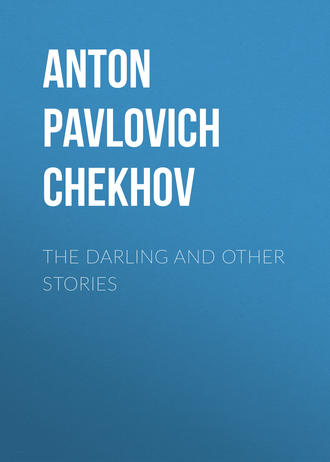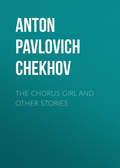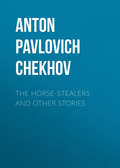
Антон Чехов
The Darling and Other Stories
III
"The prince is staying at Malozyomovo, and he asks to be remembered to you," said Lida to her mother. She had just come in, and was taking off her gloves. "He gave me a great deal of interesting news.. He promised to raise the question of a medical relief centre at Malozyomovo again at the provincial assembly, but he says there is very little hope of it." And turning to me, she said: "Excuse me, I always forget that this cannot be interesting to you."
I felt irritated.
"Why not interesting to me?" I said, shrugging my shoulders. "You do not care to know my opinion, but I assure you the question has great interest for me."
"Yes?"
"Yes. In my opinion a medical relief centre at Malozyomovo is quite unnecessary."
My irritation infected her; she looked at me, screwing up her eyes, and asked:
"What is necessary? Landscapes?"
"Landscapes are not, either. Nothing is."
She finished taking off her gloves, and opened the newspaper, which had just been brought from the post. A minute later she said quietly, evidently restraining herself:
"Last week Anna died in childbirth, and if there had been a medical relief centre near, she would have lived. And I think even landscape-painters ought to have some opinions on the subject."
"I have a very definite opinion on that subject, I assure you," I answered; and she screened herself with the newspaper, as though unwilling to listen to me. "To my mind, all these schools, dispensaries, libraries, medical relief centres, under present conditions, only serve to aggravate the bondage of the people. The peasants are fettered by a great chain, and you do not break the chain, but only add fresh links to it-that's my view of it."
She raised her eyes to me and smiled ironically, and I went on trying to formulate my leading idea.
"What matters is not that Anna died in childbirth, but that all these Annas, Mavras, Pelageas, toil from early morning till dark, fall ill from working beyond their strength, all their lives tremble for their sick and hungry children, all their lives are being doctored, and in dread of death and disease, fade and grow old early, and die in filth and stench. Their children begin the same story over again as soon as they grow up, and so it goes on for hundreds of years and milliards of men live worse than beasts- in continual terror, for a mere crust of bread. The whole horror of their position lies in their never having time to think of their souls, of their image and semblance. Cold, hunger, animal terror, a burden of toil, like avalanches of snow, block for them every way to spiritual activity-that is, to what distinguishes man from the brutes and what is the only thing which makes life worth living. You go to their help with hospitals and schools, but you don't free them from their fetters by that; on the contrary, you bind them in closer bonds, as, by introducing new prejudices, you increase the number of their wants, to say nothing of the fact that they've got to pay the Zemstvo for drugs and books, and so toil harder than ever."
"I am not going to argue with you," said Lida, putting down the paper. "I've heard all that before. I will only say one thing: one cannot sit with one's hands in one's lap. It's true that we are not saving humanity, and perhaps we make a great many mistakes; but we do what we can, and we are right. The highest and holiest task for a civilised being is to serve his neighbours, and we try to serve them as best we can. You don't like it, but one can't please every one."
"That's true, Lida," said her mother-"that's true."
In Lida's presence she was always a little timid, and looked at her nervously as she talked, afraid of saying something superfluous or inopportune. And she never contradicted her, but always assented: "That's true, Lida-that's true."
"Teaching the peasants to read and write, books of wretched precepts and rhymes, and medical relief centres, cannot diminish either ignorance or the death-rate, just as the light from your windows cannot light up this huge garden," said I. "You give nothing. By meddling in these people's lives you only create new wants in them, and new demands on their labour."
"Ach! Good heavens! But one must do something!" said Lida with vexation, and from her tone one could see that she thought my arguments worthless and despised them.
"The people must be freed from hard physical labour," said I. "We must lighten their yoke, let them have time to breathe, that they may not spend all their lives at the stove, at the wash-tub, and in the fields, but may also have time to think of their souls, of God-may have time to develop their spiritual capacities. The highest vocation of man is spiritual activity-the perpetual search for truth and the meaning of life. Make coarse animal labour unnecessary for them, let them feel themselves free, and then you will see what a mockery these dispensaries and books are. Once a man recognises his true vocation, he can only be satisfied by religion, science, and art, and not by these trifles."
"Free them from labour?" laughed Lida. "But is that possible?"
"Yes. Take upon yourself a share of their labour. If all of us, townspeople and country people, all without exception, would agree to divide between us the labour which mankind spends on the satisfaction of their physical needs, each of us would perhaps need to work only for two or three hours a day. Imagine that we all, rich and poor, work only for three hours a day, and the rest of our time is free. Imagine further that in order to depend even less upon our bodies and to labour less, we invent machines to replace our work, we try to cut down our needs to the minimum. We would harden ourselves and our children that they should not be afraid of hunger and cold, and that we shouldn't be continually trembling for their health like Anna, Mavra, and Pelagea. Imagine that we don't doctor ourselves, don't keep dispensaries, tobacco factories, distilleries-what a lot of free time would be left us after all! All of us together would devote our leisure to science and art. Just as the peasants sometimes work, the whole community together mending the roads, so all of us, as a community, would search for truth and the meaning of life, and I am convinced that the truth would be discovered very quickly; man would escape from this continual, agonising, oppressive dread of death, and even from death itself."
"You contradict yourself, though," said Lida. "You talk about science, and are yourself opposed to elementary education."
"Elementary education when a man has nothing to read but the signs on public houses and sometimes books which he cannot understand- such education has existed among us since the times of Rurik; Gogol's Petrushka has been reading for ever so long, yet as the village was in the days of Rurik so it has remained. What is needed is not elementary education, but freedom for a wide development of spiritual capacities. What are wanted are not schools, but universities."
"You are opposed to medicine, too."
"Yes. It would be necessary only for the study of diseases as natural phenomena, and not for the cure of them. If one must cure, it should not be diseases, but the causes of them. Remove the principal cause – physical labour, and then there will be no disease. I don't believe in a science that cures disease," I went on excitedly. "When science and art are real, they aim not at temporary private ends, but at eternal and universal-they seek for truth and the meaning of life, they seek for God, for the soul, and when they are tied down to the needs and evils of the day, to dispensaries and libraries, they only complicate and hamper life. We have plenty of doctors, chemists, lawyers, plenty of people can read and write, but we are quite without biologists, mathematicians, philosophers, poets. The whole of our intelligence, the whole of our spiritual energy, is spent on satisfying temporary, passing needs. Scientific men, writers, artists, are hard at work; thanks to them, the conveniences of life are multiplied from day to day. Our physical demands increase, yet truth is still a long way off, and man still remains the most rapacious and dirty animal; everything is tending to the degeneration of the majority of mankind, and the loss forever of all fitness for life. In such conditions an artist's work has no meaning, and the more talented he is, the stranger and the more unintelligible is his position, as when one looks into it, it is evident that he is working for the amusement of a rapacious and unclean animal, and is supporting the existing order. And I don't care to work and I won't work… Nothing is any use; let the earth sink to perdition!"
"Misuce, go out of the room!" said Lida to her sister, apparently thinking my words pernicious to the young girl.
Genya looked mournfully at her mother and sister, and went out of the room.
"These are the charming things people say when they want to justify their indifference," said Lida. "It is easier to disapprove of schools and hospitals, than to teach or heal."
"That's true, Lida-that's true," the mother assented.
"You threaten to give up working," said Lida. "You evidently set a high value on your work. Let us give up arguing; we shall never agree, since I put the most imperfect dispensary or library of which you have just spoken so contemptuously on a higher level than any landscape." And turning at once to her mother, she began speaking in quite a different tone: "The prince is very much changed, and much thinner than when he was with us last. He is being sent to Vichy."
She told her mother about the prince in order to avoid talking to me. Her face glowed, and to hide her feeling she bent low over the table as though she were short-sighted, and made a show of reading the newspaper. My presence was disagreeable to her. I said good-bye and went home.
IV
It was quite still out of doors; the village on the further side of the pond was already asleep; there was not a light to be seen, and only the stars were faintly reflected in the pond. At the gate with the lions on it Genya was standing motionless, waiting to escort me.
"Every one is asleep in the village," I said to her, trying to make out her face in the darkness, and I saw her mournful dark eyes fixed upon me. "The publican and the horse-stealers are asleep, while we, well-bred people, argue and irritate each other."
It was a melancholy August night-melancholy because there was already a feeling of autumn; the moon was rising behind a purple cloud, and it shed a faint light upon the road and on the dark fields of winter corn by the sides. From time to time a star fell. Genya walked beside me along the road, and tried not to look at the sky, that she might not see the falling stars, which for some reason frightened her.
"I believe you are right," she said, shivering with the damp night air. "If people, all together, could devote themselves to spiritual ends, they would soon know everything."
"Of course. We are higher beings, and if we were really to recognise the whole force of human genius and lived only for higher ends, we should in the end become like gods. But that will never be-mankind will degenerate till no traces of genius remain."
When the gates were out of sight, Genya stopped and shook hands with me.
"Good-night," she said, shivering; she had nothing but her blouse over her shoulders and was shrinking with cold. "Come to-morrow."
I felt wretched at the thought of being left alone, irritated and dissatisfied with myself and other people; and I, too, tried not to look at the falling stars. "Stay another minute," I said to her, "I entreat you."
I loved Genya. I must have loved her because she met me when I came and saw me off when I went away; because she looked at me tenderly and enthusiastically. How touchingly beautiful were her pale face, slender neck, slender arms, her weakness, her idleness, her reading. And intelligence? I suspected in her intelligence above the average. I was fascinated by the breadth of her views, perhaps because they were different from those of the stern, handsome Lida, who disliked me. Genya liked me, because I was an artist. I had conquered her heart by my talent, and had a passionate desire to paint for her sake alone; and I dreamed of her as of my little queen who with me would possess those trees, those fields, the mists, the dawn, the exquisite and beautiful scenery in the midst of which I had felt myself hopelessly solitary and useless.
"Stay another minute," I begged her. "I beseech you."
I took off my overcoat and put it over her chilly shoulders; afraid of looking ugly and absurd in a man's overcoat, she laughed, threw it off, and at that instant I put my arms round her and covered her face, shoulders, and hands with kisses.
"Till to-morrow," she whispered, and softly, as though afraid of breaking upon the silence of the night, she embraced me. "We have no secrets from one another. I must tell my mother and my sister at once… It's so dreadful! Mother is all right; mother likes you-but Lida!"
She ran to the gates.
"Good-bye!" she called.
And then for two minutes I heard her running. I did not want to go home, and I had nothing to go for. I stood still for a little time hesitating, and made my way slowly back, to look once more at the house in which she lived, the sweet, simple old house, which seemed to be watching me from the windows of its upper storey, and understanding all about it. I walked by the terrace, sat on the seat by the tennis ground, in the dark under the old elm-tree, and looked from there at the house. In the windows of the top storey where Misuce slept there appeared a bright light, which changed to a soft green-they had covered the lamp with the shade. Shadows began to move… I was full of tenderness, peace, and satisfaction with myself-satisfaction at having been able to be carried away by my feelings and having fallen in love, and at the same time I felt uncomfortable at the thought that only a few steps away from me, in one of the rooms of that house there was Lida, who disliked and perhaps hated me. I went on sitting there wondering whether Genya would come out; I listened and fancied I heard voices talking upstairs.
About an hour passed. The green light went out, and the shadows were no longer visible. The moon was standing high above the house, and lighting up the sleeping garden and the paths; the dahlias and the roses in front of the house could be seen distinctly, and looked all the same colour. It began to grow very cold. I went out of the garden, picked up my coat on the road, and slowly sauntered home.
When next day after dinner I went to the Voltchaninovs, the glass door into the garden was wide open. I sat down on the terrace, expecting Genya every minute, to appear from behind the flower-beds on the lawn, or from one of the avenues, or that I should hear her voice from the house. Then I walked into the drawing-room, the dining-room. There was not a soul to be seen. From the dining-room I walked along the long corridor to the hall and back. In this corridor there were several doors, and through one of them I heard the voice of Lida:
"'God.. sent.. a crow,'" she said in a loud, emphatic voice, probably dictating-"'God sent a crow a piece of cheese.. A crow.. a piece of cheese.'.. Who's there?" she called suddenly, hearing my steps.
"It's I."
"Ah! Excuse me, I cannot come out to you this minute; I'm giving Dasha her lesson."
"Is Ekaterina Pavlovna in the garden?"
"No, she went away with my sister this morning to our aunt in the province of Penza. And in the winter they will probably go abroad," she added after a pause. "'God sent.. the crow.. a piece.. of cheese.'.. Have you written it?"
I went into the hall, and stared vacantly at the pond and the village, and the sound reached me of "A piece of cheese… God sent the crow a piece of cheese."
And I went back by the way I had come here for the first time- first from the yard into the garden past the house, then into the avenue of lime-trees… At this point I was overtaken by a small boy who gave me a note:
"I told my sister everything and she insists on my parting from you," I read. "I could not wound her by disobeying. God will give you happiness. Forgive me. If only you knew how bitterly my mother and I are crying!"
Then there was the dark fir avenue, the broken-down fence… On the field where then the rye was in flower and the corncrakes were calling, now there were cows and hobbled horses. On the slope there were bright green patches of winter corn. A sober workaday feeling came over me and I felt ashamed of all I had said at the Voltchaninovs', and felt bored with life as I had been before. When I got home, I packed and set off that evening for Petersburg.
-
I never saw the Voltchaninovs again. Not long ago, on my way to the Crimea, I met Byelokurov in the train. As before, he was wearing a jerkin and an embroidered shirt, and when I asked how he was, he replied that, God be praised, he was well. We began talking. He had sold his old estate and bought another smaller one, in the name of Liubov Ivanovna. He could tell me little about the Voltchaninovs. Lida, he said, was still living in Shelkovka and teaching in the school; she had by degrees succeeded in gathering round her a circle of people sympathetic to her who made a strong party, and at the last election had turned out Balagin, who had till then had the whole district under his thumb. About Genya he only told me that she did not live at home, and that he did not know where she was.
I am beginning to forget the old house, and only sometimes when I am painting or reading I suddenly, apropos of nothing, remember the green light in the window, the sound of my footsteps as I walked home through the fields in the night, with my heart full of love, rubbing my hands in the cold. And still more rarely, at moments when I am sad and depressed by loneliness, I have dim memories, and little by little I begin to feel that she is thinking of me, too – that she is waiting for me, and that we shall meet..
Misuce, where are you?
THREE YEARS
I
IT was dark, and already lights had begun to gleam here and there in the houses, and a pale moon was rising behind the barracks at the end of the street. Laptev was sitting on a bench by the gate waiting for the end of the evening service at the Church of St. Peter and St. Paul. He was reckoning that Yulia Sergeyevna would pass by on her way from the service, and then he would speak to her, and perhaps spend the whole evening with her.
He had been sitting there for an hour and a half already, and all that time his imagination had been busy picturing his Moscow rooms, his Moscow friends, his man Pyotr, and his writing-table. He gazed half wonderingly at the dark, motionless trees, and it seemed strange to him that he was living now, not in his summer villa at Sokolniki, but in a provincial town in a house by which a great herd of cattle was driven every morning and evening, accompanied by terrible clouds of dust and the blowing of a horn. He thought of long conversations in which he had taken part quite lately in Moscow-conversations in which it had been maintained that one could live without love, that passionate love was an obsession, that finally there is no such love, but only a physical attraction between the sexes-and so on, in the same style; he remembered them and thought mournfully that if he were asked now what love was, he could not have found an answer.
The service was over, the people began to appear. Laptev strained his eyes gazing at the dark figures. The bishop had been driven by in his carriage, the bells had stopped ringing, and the red and green lights in the belfry were one after another extinguished- there had been an illumination, as it was dedication day-but the people were still coming out, lingering, talking, and standing under the windows. But at last Laptev heard a familiar voice, his heart began beating violently, and he was overcome with despair on seeing that Yulia Sergeyevna was not alone, but walking with two ladies.
"It's awful, awful!" he whispered, feeling jealous. "It's awful!"
At the corner of the lane, she stopped to say good-bye to the ladies, and while doing so glanced at Laptev.
"I was coming to see you," he said. "I'm coming for a chat with your father. Is he at home?"
"Most likely," she answered. "It's early for him to have gone to the club."
There were gardens all along the lane, and a row of lime-trees growing by the fence cast a broad patch of shadow in the moonlight, so that the gate and the fences were completely plunged in darkness on one side, from which came the sounds of women whispering, smothered laughter, and someone playing softly on a balalaika. There was a fragrance of lime-flowers and of hay. This fragrance and the murmur of the unseen whispers worked upon Laptev. He was all at once overwhelmed with a passionate longing to throw his arms round his companion, to shower kisses on her face, her hands, her shoulders, to burst into sobs, to fall at her feet and to tell her how long he had been waiting for her. A faint scarcely perceptible scent of incense hung about her; and that scent reminded him of the time when he, too, believed in God and used to go to evening service, and when he used to dream so much of pure romantic love. And it seemed to him that, because this girl did not love him, all possibility of the happiness he had dreamed of then was lost to him forever.
She began speaking sympathetically of the illness of his sister, Nina Fyodorovna. Two months before his sister had undergone an operation for cancer, and now every one was expecting a return of the disease.
"I went to see her this morning," said Yulia Sergeyevna, "and it seemed to me that during the last week she has, not exactly grown thin, but has, as it were, faded."
"Yes, yes," Laptev agreed. "There's no return of the symptoms, but every day I notice she grows weaker and weaker, and is wasting before my eyes. I don't understand what's the matter with her."
"Oh dear! And how strong she used to be, plump and rosy!" said Yulia Sergeyevna after a moment's silence. "Every one here used to call her the Moscow lady. How she used to laugh! On holidays she used to dress up like a peasant girl, and it suited her so well."
Doctor Sergey Borisovitch was at home; he was a stout, red-faced man, wearing a long coat that reached below his knees, and looking as though he had short legs. He was pacing up and down his study, with his hands in his pockets, and humming to himself in an undertone, "Ru-ru-ru-ru." His grey whiskers looked unkempt, and his hair was unbrushed, as though he had just got out of bed. And his study with pillows on the sofa, with stacks of papers in the corners, and with a dirty invalid poodle lying under the table, produced the same impression of unkemptness and untidiness as himself.
"M. Laptev wants to see you," his daughter said to him, going into his study.
"Ru-ru-ru-ru," he hummed louder than ever, and turning into the drawing-room, gave his hand to Laptev, and asked: "What good news have you to tell me?"
It was dark in the drawing-room. Laptev, still standing with his hat in his hand, began apologising for disturbing him; he asked what was to be done to make his sister sleep at night, and why she was growing so thin; and he was embarrassed by the thought that he had asked those very questions at his visit that morning.
"Tell me," he said, "wouldn't it be as well to send for some specialist on internal diseases from Moscow? What do you think of it?"
The doctor sighed, shrugged his shoulders, and made a vague gesture with his hands.
It was evident that he was offended. He was a very huffy man, prone to take offence, and always ready to suspect that people did not believe in him, that he was not recognised or properly respected, that his patients exploited him, and that his colleagues showed him ill-will. He was always jeering at himself, saying that fools like him were only made for the public to ride rough-shod over them.
Yulia Sergeyevna lighted the lamp. She was tired out with the service, and that was evident from her pale, exhausted face, and her weary step. She wanted to rest. She sat down on the sofa, put her hands on her lap, and sank into thought. Laptev knew that he was ugly, and now he felt as though he were conscious of his ugliness all over his body. He was short, thin, with ruddy cheeks, and his hair had grown so thin that his head felt cold. In his expression there was none of that refined simplicity which makes even rough, ugly faces attractive; in the society of women, he was awkward, over-talkative, affected. And now he almost despised himself for it. He must talk that Yulia Sergeyevna might not be bored in his company. But what about? About his sister's illness again?
And he began to talk about medicine, saying what is usually said. He approved of hygiene, and said that he had long ago wanted to found a night-refuge in Moscow-in fact, he had already calculated the cost of it. According to his plan the workmen who came in the evening to the night-refuge were to receive a supper of hot cabbage soup with bread, a warm, dry bed with a rug, and a place for drying their clothes and their boots.
Yulia Sergeyevna was usually silent in his presence, and in a strange way, perhaps by the instinct of a lover, he divined her thoughts and intentions. And now, from the fact that after the evening service she had not gone to her room to change her dress and drink tea, he deduced that she was going to pay some visit elsewhere.
"But I'm in no hurry with the night-refuge," he went on, speaking with vexation and irritability, and addressing the doctor, who looked at him, as it were, blankly and in perplexity, evidently unable to understand what induced him to raise the question of medicine and hygiene. "And most likely it will be a long time, too, before I make use of our estimate. I fear our night-shelter will fall into the hands of our pious humbugs and philanthropic ladies, who always ruin any undertaking."
Yulia Sergeyevna got up and held out her hand to Laptev.
"Excuse me," she said, "it's time for me to go. Please give my love to your sister."
"Ru-ru-ru-ru," hummed the doctor. "Ru-ru-ru-ru."
Yulia Sergeyevna went out, and after staying a little longer, Laptev said good-bye to the doctor and went home. When a man is dissatisfied and feels unhappy, how trivial seem to him the shapes of the lime-trees, the shadows, the clouds, all the beauties of nature, so complacent, so indifferent! By now the moon was high up in the sky, and the clouds were scudding quickly below. "But how naïve and provincial the moon is, how threadbare and paltry the clouds!" thought Laptev. He felt ashamed of the way he had talked just now about medicine, and the night-refuge. He felt with horror that next day he would not have will enough to resist trying to see her and talk to her again, and would again be convinced that he was nothing to her. And the day after-it would be the same. With what object? And how and when would it all end?
At home he went in to see his sister. Nina Fyodorovna still looked strong and gave the impression of being a well-built, vigorous woman, but her striking pallor made her look like a corpse, especially when, as now, she was lying on her back with her eyes closed; her eldest daughter Sasha, a girl of ten years old, was sitting beside her reading aloud from her reading-book.
"Alyosha has come," the invalid said softly to herself.
There had long been established between Sasha and her uncle a tacit compact, to take turns in sitting with the patient. On this occasion Sasha closed her reading-book, and without uttering a word, went softly out of the room. Laptev took an historical novel from the chest of drawers, and looking for the right page, sat down and began reading it aloud.
Nina Fyodorovna was born in Moscow of a merchant family. She and her two brothers had spent their childhood and early youth, living at home in Pyatnitsky Street. Their childhood was long and wearisome; her father treated her sternly, and had even on two or three occasions flogged her, and her mother had had a long illness and died. The servants were coarse, dirty, and hypocritical; the house was frequented by priests and monks, also hypocritical; they ate and drank and coarsely flattered her father, whom they did not like. The boys had the good-fortune to go to school, while Nina was left practically uneducated. All her life she wrote an illegible scrawl, and had read nothing but historical novels. Seventeen years ago, when she was twenty-two, on a summer holiday at Himki, she made the acquaintance of her present husband, a landowner called Panaurov, had fallen in love with him, and married him secretly against her father's will. Panaurov, a handsome, rather impudent fellow, who whistled and lighted his cigarette from the holy lamp, struck the father as an absolutely worthless person. And when the son-in-law began in his letters demanding a dowry, the old man wrote to his daughter that he would send her furs, silver, and various articles that had been left at her mother's death, as well as thirty thousand roubles, but without his paternal blessing. Later he sent another twenty thousand. This money, as well as the dowry, was spent; the estate had been sold and Panaurov moved with his family to the town and got a job in a provincial government office. In the town he formed another tie, and had a second family, and this was the subject of much talk, as his illicit family was not a secret.
Nina Fyodorovna adored her husband. And now, listening to the historical novel, she was thinking how much she had gone through in her life, how much she had suffered, and that if any one were to describe her life it would make a very pathetic story. As the tumour was in her breast, she was persuaded that love and her domestic grief were the cause of her illness, and that jealousy and tears had brought her to her hopeless state.







